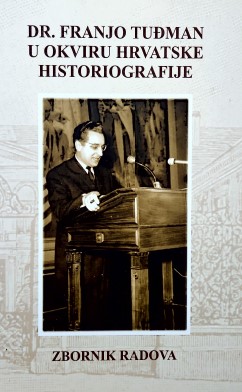KATOLIČKA CRKVA I KATOLICIZAM U DJELU FRANJE TUĐMANA
CATHOLIC CHURCH AND CATHOLICISM IN FRANJO TUĐMAN’S WORKS
Author(s): Jure Krišto
Subject(s): Christian Theology and Religion, History of Church(es), Political history, Government/Political systems, Politics and religion, Nationalism Studies, History of Communism
Published by: Hrvatski institut za povijest
Keywords: Tuđman; religion; Catholic Church; Catholicism; propaganda; Serbian nationalism; Pope; Stepinac; historiography; manipulations; communism; Party;
Summary/Abstract: There are few historians whose historiographical pursuits were so closely intertwined with their personal fates as Franjo Tuđman’s had been. Few people ever met the prerequisites for it in the way Tuđman did. A distinguished and loyal follower of the Marxist ideas, devoted to socialism and socialist development, and a high-ranking official of the Communist Party and the Yugoslav Army, Tuđman started to break free from the control of the Party, which had kept a close eye on the interpretation of historical events, in particular of modern history, in his historiographical research, finally bringing himself to a point where the Party was forced to discipline him. Tuđman’s views clashed with those of the Party leaders when he stood up against certain interpretations of recent Croatian history that had been built on political hypotheses and definitions, for instance, interpretations about the Ustasha concentration camp Jasenovac, the number of casualties in World War II, the alleged historical guilt of the Croatian people, and the alleged negative role of the Catholic Church. In short, when Tuđman attempted to rectify the distorted image of Croatian history, he himself became the target of persecution. It left a permanent stain on Croatian historiography, since some historians joined in the persecution driven by motives that had little to do with historiography. By distancing himself from the Party, Tuđman gradually distanced himself from Marxism as a philosophical system and from the socialist system of the country, in which Marxism and the Party dictated all aspects of life, historiography included. There are indications that he started to approach Catholicism, or better still, the Catholic Church as its historical embodiment. In the last phase of his intellectual pursuits, which coincided with the fiercest attacks on everything Croatian, Tuđman wrote a systematic defense of the Catholic Church, offering sound arguments against the theses of many Serbian historians and publicists, who slandered the Church and its leader at the time of World War II, Archbishop Alojzije Stepinac. As Croatian president, he evoked the historical connections between Croats and the Holy See in his dealings with the Pope, emphasized the Croats’ historical orientation on the West, and confirmed their devotedness to the Holy See and to the Catholic values. He expressed his gratitude to the Holy See for the favors they did to the Croats in decisive moments, and he promised that Croats would remain on this course. Tuđman’s life path distanced him from Catholicism, but his suffering gradually brought him back to it. His life and career are a story about intellectual pursuits fueled by curiosity, about a great sense of justice and truth, about an extensive opus as a writer, dedication to the idea of Croatian sovereignty, an acute sense of political moment, and the grand establishment of an independent Croatian state. Without a shadow of doubt, his life had been lived to the fullest, and fulfilled the hopes of many!
- Page Range: 381-402
- Page Count: 22
- Publication Year: 2011
- Language: Croatian
- Content File-PDF

